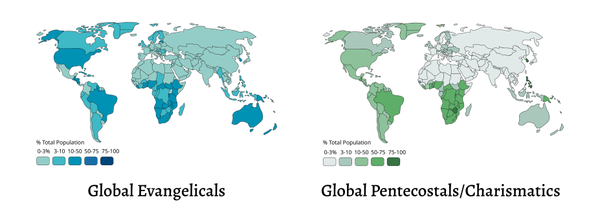That He Is and No More
In preparing a message on prayer recently, I remembered a quote that previously impacted me:
"What a man is on his knees before God, that he is, and no more"
I don't like quoting people without a proper source, and I seemed to remember it was by Robert Murray M'Cheyne, so I set off in search of the original author, to confirm this.
M'Cheyne or Owen?
There are a number of unsourced attributions - to M'Cheyne online (1, 2), and in books (1, 2, 3), or John Owen (1, 2, 3). The earliest attribution of these was to M'Cheyne in Pray in the Spirit by Arthur Wallis, published in 1970.However, it doesn't seem to have been said by M'Cheyne. I found a blog post by Stephen Steele questioning him (or John Owen) ever saying this, and linking to another blog post by Father Horton on the Fauxtations website, assessing a similar quote to attributed to St Anthony of Padua ("What we are before God we are and nothing more") as a misattribution.In A Communion of Love: The Christ-Centered Spirituality of Robert Murray M'Cheyne by Jordan Stone, the attribution to M'Cheyne is questioned but a fuller quote from John Owen is given in Footnote 777:
A similar quote often attributed to M'Cheyne is as follows: "What a man is on his knees before God, that he is- and nothing more." No source exists in those secondary resources that reference it, nor has one yet been found. It sounds very similar to a statement attributed to John Owen that "a minister may fill his pews and communion roll but what he is on his knees in secret before God Almighty, that he is and no more." Thomas, A Puritan Gold Treasury, 192.
I can't find a copy of A Puritan Gold Treasury in electronic format, but it is purchasable online. I did search through all 21 volumes of The Works of John Owen on the Internet Archive (indexed helpfully at The Digital Puritan; at over 500 pages each, John Owen wrote a lot!) and couldn't find this reference. But I did eventually find a quote more similar to the original, in Volume 13, The Nature, Power, Deceit, and Prevalency of the Remainders of Indwelling Sin in Believers, on p180 :
Hence our Saviour lets us know, Matt. vi. 6. what a man is in secret, in these private duties, that he is in the eyes of God, and no more.
You can read this more easily in a modern PDF of the 1885 Glasgow Edition of this book (nicely produced by William Gross), on p115.I would guess that this is the true quote, and that the preface of "a minister may fill his pews and communion roll" is an embellishment by somebody else - although Owen uses the word "communion" a lot, I can't find one mention of a "communion roll" or "pews" - in his works.
An Earlier Quote from St Francis
I did also find a similar (but much older!) quote attributed to St Francis of Assisi in The Rule of the Secular Franciscan Order: "Francis reminds us of this in Admonition 19, we are what we are before God and nothing more". In The Writings of St. Francis of Assisi, Part 1 Admonition 20 we find: "Blessed is the servant who does not regard himself as better when he is esteemed and extolled by men than when he is reputed as mean, simple, and despicable: for what a man is in the sight of God, so much he is, and no more.". This is footnoted with some further attribution (the embedded links are mine):
See Bonav. Leg. Maj., VI, 1: "And he had these words continually in his mouth: 'what a man is in the eyes of God, so much he is, and no more.'" See also Imitation of Christ, Bk. III, Chap. L, where the same saying of St. Francis is quoted.
The Bonaventure quote from Legenda Maiore gives us this in Latin: "Sed et verbum hoc dicere solitus erat: "Quantum homo est in oculis Dei, tantum est et non plus".
Who we are before God
It's interesting to think of the sequence of inspiration and reflection that these gradually changing quotes form over time:
- "When you pray, go into your room, close the door and pray to your Father, who is unseen. Then your Father, who sees what is done in secret, will reward you". (Jesus, 1st Century, Matthew 6:6 NIV Translation)
- "What a man is in the sight of God, so much he is, and no more" (St Francis of Assisi, 13th Century, Admonitions, 20).
- "What a man is in secret, in these private duties, that he is in the eyes of God, and no more." (John Owen, 17th Century, Indwelling Sin in Believers).
- "What a man is on his knees before God, that he is - and nothing more" (possibly M'Cheyne, 19th Century, but equally possibly someone else loosely quoting Owen)
The difference in emphasis is interesting:
- Jesus' original saying in Matthew 6 emphasizes God the Father seeing and valuing your prayer: God sees what is in secret, where others don't. Although it doesn't clearly state that what is done in secret is the truest reflection of your nature or character, that is arguably implicit in the context of 6:1-6 stating that if the motive of prayer or given is being seen by others, God will not reward you.
- St Francis's quote emphasizes that since God sees our true nature, what He sees of us is who we really are. Any other layers of pretence we put on are invisible to God, and are not really true of us. We therefore ought only to value what God sees in us, and not what others sees in us. Prayer is not explicitly in focus here, but rather our reputations.
- Owen's quote emphasizes again that God really values who we are in secret, not what we project. The focus is on what God sees, rather than on what our essential nature is. The context is discussing our life of prayer - those "duties of private communion with God [which] are the means of receiving supplies of spiritual strength from him". We need to come to God to receive the grace and strength He gives in communion with Him.
- The form attributed to M'Cheyne returns the focus to our nature, character or being, using a similar formulation to St Francis - and pictures us on our knees before God, as though the rest of the universe has become irrelevant. We are once again stripped back to what is really going on in our hearts, and the deepest reality of our hearts is how we relate to God.
(Of course, "a man" in all of these could better be "a person", since gender is irrelevant here)All this shows that Christian quotes on prayer can be meaningful, old, and passed down over a long period of time without anyone knowing who originally said them - and that you can spend a long time researching this on the Internet! Let's pursue genuine communion with God, and not a self-image or image before others that is ultimately a fake.
PS I haven't posted a blog post in seven years, and this still works! Phew!




